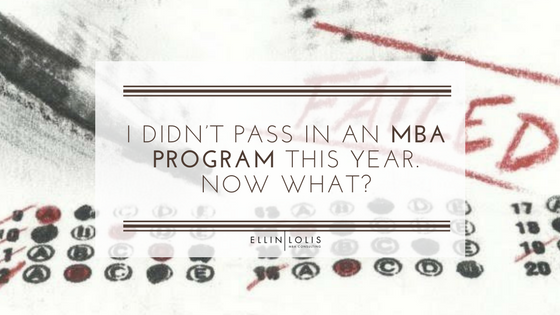Didn’t pass your MBA?
10,000. 5,126. 12. What do these numbers have in common?
They are all measures of failures. Thomas Edison failed 10,000 times before successfully inventing the light bulb. Sir James Dyson failed 5,126 times before inventing a bagless vacuum. And J.K. Rowling was rejected by all 12 major publishing houses before publishing Harry Potter.
Perhaps after the recent release of MBA decisions you can empathize with Edison, Dyson, and Rowling. The truth is, despite their hard work and dedication, many candidates reach the end of the process only to discover they haven’t passed in a single program.
You took some time off to process the information, but now what? Despite the sting of the ding, this is a great moment for you to begin to reflect not only on what went wrong during the MBA process, but also on the life and career you hope to build. Keep reading for guiding questions to help you navigate this reflection process.
Didn’t pass your MBA?
Soul searching — what went wrong?

As hard as it is to admit, most applicants who are not admitted receive this answer because of a flaw in their application. There are many flaws that can appear, but some of the most common are unclear or unfounded career goals, a low GMAT for the school you are applying to, lack of experience or too much experience, lack of demonstrated interest in the school… the list goes on. Taking an objective look at your application and analyzing how you stacked up against your competition will help you identify areas for improvement to focus on before applying again. Oftentimes, having outside help (a trusted friend who attended an MBA, a professional mentor, or an admissions consultant, for example) can be helpful, as outside parties are often more objective.
Didn’t pass your MBA?
What role will an MBA play in your life and career?

After thinking about what went wrong, it’s a good idea to reflect on your career and your goals before thinking about reapplying. As hard as it can be to admit, an MBA doesn’t make sense for every career path. For some, a different type of specialized masters degree or even just additional on the job experience can help more in advancing your career. Think deeply about where you want to end up 5–10 years from now, talk to others who have forged similar paths, and think about if an MBA is right for you.
Learn more about… HOW TO DECIDE BETWEEN MBA PROGRAMS
How much can you realistically improve in one year?

This is another difficult question, as we can’t be certain what the future holds. However, one of the key elements of a reapplicant application is examining how the candidate has grown since last applying, since the package they presented last year wasn’t quite right. Think about things like whether or not you will be able to improve your GMAT score, if you will receive a promotion or will have taken on a project that allowed you to expand key skills, or if you will have added international experience by September. If you don’t think you will be able to present anything different before your next application, you should seriously consider if reapplying in the next cycle makes the most sense. Remember, as long as it makes sense for your age and experience, you can always reapply again in 2 years.
Learn more about… HOW TO FINANCE YOUR MBA
Are there other schools you didn’t apply to but would be interested in pursuing?

Though you probably spent the better part of the last year dreaming about the schools you applied to, now is a good time to consider if you chose your schools correctly based on your profile. Many times, a “no” can be the result of a mismatch between your profile and the type of profile the school generally chooses. As you think about reapplying, consider if mismatches were a factor, and also consider applying to new schools that will be considering your profile for the first time.
Thinking about reapplying or need to talk to someone about your chances as a reapplicant? Get in touch and schedule your free consultation.
“I have not failed. I’ve just found 10,000 ways that won’t work.” — Thomas A. Edison
Real MBA Essays That Got People In
School-specific sample essays that got our clients accepted





